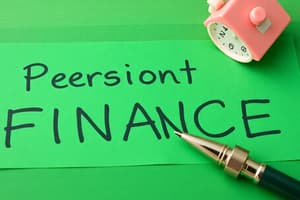Podcast
Questions and Answers
Which of the following refers to personal belongings which have value?
Which of the following refers to personal belongings which have value?
- Net worth
- Liabilities
- Assets (correct)
- Net profit
Which of the following is an example of a personal asset?
Which of the following is an example of a personal asset?
- Mortgage
- Credit card balance
- Cash (correct)
- Rent
An individual has total assets of $120,000 and total liabilities of $80,000. What is his net worth?
An individual has total assets of $120,000 and total liabilities of $80,000. What is his net worth?
$40,000
Which of the following is considered to be a short-term goal?
Which of the following is considered to be a short-term goal?
Which type of people likes to plan for the future and are prepared for any type of financial situation?
Which type of people likes to plan for the future and are prepared for any type of financial situation?
Which of the following refers to individuals who do not consider money as a necessity and do not have much of an opinion on money?
Which of the following refers to individuals who do not consider money as a necessity and do not have much of an opinion on money?
What does 'A' represent in SMART goal setting practices?
What does 'A' represent in SMART goal setting practices?
Which of the following is considered to be a long-term financial goal?
Which of the following is considered to be a long-term financial goal?
Which step of the financial planning process involves devising strategies to help accomplish financial goals?
Which step of the financial planning process involves devising strategies to help accomplish financial goals?
Which of the following is the last step in creating a personal financial plan?
Which of the following is the last step in creating a personal financial plan?
Flashcards are hidden until you start studying
Study Notes
Personal Finance Terms
- Assets: Personal belongings that hold value, such as cash, property, and investments.
- Liabilities: Financial obligations or debts owed by an individual.
- Net Worth: The difference between total assets and total liabilities, representing an individual’s financial standing.
Personal Assets
- Examples of personal assets include cash, real estate, stocks, and other valuables.
Calculating Net Worth
- Net worth is calculated as Total Assets (120,000)minusTotalLiabilities(120,000) minus Total Liabilities (120,000)minusTotalLiabilities(80,000), resulting in a net worth of $40,000.
Financial Goals
- Short-term Goals: Typically achievable within a year, e.g., saving for a family vacation.
- Long-term Goals: Goals set for a period beyond a year, such as saving for retirement.
Financial Behavior Types
- Savers: Individuals who prefer saving money and planning for the future.
- Spenders: Individuals who prioritize spending and may not focus on saving.
- Risk Takers: People willing to take financial risks for potential rewards.
- Security Seekers: People who value financial security and stability.
SMART Goals Framework
- A in SMART stands for Attainable, indicating that goals should be realistic and achievable.
Steps in Financial Planning
- Identifying Courses of Action involves developing strategies to reach financial goals.
- Finalizing the Plan is the stage where all strategies are compiled and confirmed.
- Revising the Plan is the ongoing review process to adapt and improve the financial plan as needed.
Implementing a Personal Financial Plan
- The last step in creating a personal financial plan involves Revising the Plan, which ensures that the strategies remain relevant and effective based on life changes and financial progress.
Studying That Suits You
Use AI to generate personalized quizzes and flashcards to suit your learning preferences.




